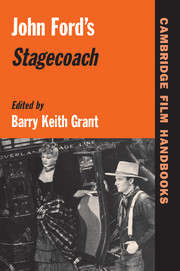Book contents
- Frontmatter
- Contents
- Acknowledgments and Credits
- List of Contributors
- Introduction: Spokes in the Wheels
- 1 Stagecoach and Hollywood's A-Western Renaissance
- 2 “Powered by a Ford”? Dudley Nichols, Authorship, and Cultural Ethos in Stagecoach
- 3 That Past, This Present: Historicizing John Ford, 1939
- 4 “A Little Bit Savage”: Stagecoach and Racial Representation
- 5 “Be a Proud, Glorified Dreg”: Class, Gender, and Frontier Democracy in Stagecoach
- 6 Stagecoach and the Quest for Selfhood
- Reviews of Stagecoach
- Filmography
- Select Bibliography
- Index
Introduction: Spokes in the Wheels
Published online by Cambridge University Press: 08 January 2010
- Frontmatter
- Contents
- Acknowledgments and Credits
- List of Contributors
- Introduction: Spokes in the Wheels
- 1 Stagecoach and Hollywood's A-Western Renaissance
- 2 “Powered by a Ford”? Dudley Nichols, Authorship, and Cultural Ethos in Stagecoach
- 3 That Past, This Present: Historicizing John Ford, 1939
- 4 “A Little Bit Savage”: Stagecoach and Racial Representation
- 5 “Be a Proud, Glorified Dreg”: Class, Gender, and Frontier Democracy in Stagecoach
- 6 Stagecoach and the Quest for Selfhood
- Reviews of Stagecoach
- Filmography
- Select Bibliography
- Index
Summary
THE GOLDEN COACH
A famous passage in Walker Percy's novel The Movie-goer testifies to the mythic power of John Ford's Stagecoach. As Binx Bolling, Percy's eponymous narrator, confesses:
The fact is, I am quite happy in a movie, even a bad movie. Other people, so I have read, treasure memorable moments in their lives – the time one climbed the Parthenon at sunrise, the summer night one met a lovely girl in Central Park, and achieved with her a sweet and natural relationship, as they say in books. I, too, once met a girl in Central Park, but it is not much to remember. What I remember is the time John Wayne killed three men with a carbine as he was falling to the dusty street in Stagecoach, and the time the kitten found Orson Welles in The Third Man.
But in fact Ford does not show us John Wayne as the Ringo Kid killing the three Plummer brothers. After Ringo drops to the dusty street as he fires his three bullets, the film cuts to Dallas (Claire Trevor), showing us her reaction to the gunfire that carries over on the soundtrack, her fear that one of those bullets may have injured or killed Ringo. Bolling remembers – or, more accurately, misremembers by embellishing – the second of Stagecoach's two thrilling climaxes as if he actually saw it. As Ed Buscombe notes about this scene, it is “believable only because we don't actually see it.
- Type
- Chapter
- Information
- John Ford's Stagecoach , pp. 1 - 20Publisher: Cambridge University PressPrint publication year: 2002



